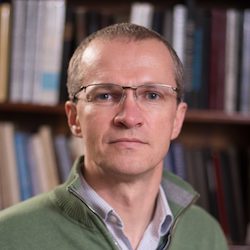Graduate Student Seminar
October 25, 2024
12:45 p.m. ET
Wean Hall 7500
October 25, 2024
12:45 p.m. ET
Wean Hall 7500
Large-scale deployment of first-principles electronic structure calculations in combination with the ever-increasing power and availability of massively parallel supercomputers have launched in past couple of decades an entirely new paradigm in modern materials science. Intuition and serendipity that were the hallmarks of materials discovery are now complemented by theory-guided searches, which have resulted in a number of important findings. However, using theory and computations to propose, with a high degree of confidence, novel and useful metastable materials still represents a significant challenge. In this talk I will present our recent attempts to solving some of the problems hindering theory-guided discovery and design of metastable phases with the particular focus on covalent and partially ionic solids. More specifically, I will discuss experimental realizability (synthesizability) of metastable crystalline phases (or polymorphs) in connection to the specific features of the potential energy surface leading to an effective computational methodology to search for, and rank potentially metastable states according to their realizability. Next, I will talk about our efforts in developing computational methods to enable large-scale assessment of the polymorph lifetimes. These are predicated on the novel solution to the problem of finding an optimal atom-to-atom mapping between infinitely periodic systems. Lastly, an emerging description of disordered and glassy systems as statistical ensembles of small-cell, periodic local minima on the potential energy surface will be discussed. This approach enables predictive modeling of atomic disorder and glasses without the need for experimental inputs. In all of these areas our recent developments offer predictions of relevant properties, which, in turn, allow for more rational and reliable searches for useful metastable materials.
 Vladan Stevanović, Colorado School of Mines & National Renewable Energy Laboratory
Vladan Stevanović, Colorado School of Mines & National Renewable Energy LaboratoryStevanović is a theoretical physicist working in computational materials science. Currently he is an Associate Professor in the Department of Metallurgy and Materials Engineering at Colorado School of Mines, with joint appointment at the National Renewable Energy Laboratory (NREL). Vladan’s research stands at the intersection between applied solid-state physics, material science, large-scale computations and big data. Motivated by renewable energy applications (photovoltaic, thermoelectric, power electronics and other), his work combines development and use of computational methods to predictively model relevant properties of solids with the goal to facilitate discovery and design of novel functional materials. Before joining Colorado School of Mines, he spent two years as a postdoctoral researcher at NREL and obtained his degrees from École Polytechnique Fédérale de Lausanne (EPFL), Switzerland, and Faculty of Physics, University of Belgrade, Serbia.
February 20 2026
10:00 AM ET
Materials Science and Engineering
High-Fidelity Atomistic Simulations of Chemistry-Microstructure Interactions in Metals, presented by Rodrigo Freitas, Massachusetts Institute of Technology
CUC McConomy Auditorium
February 20 2026
5:30 PM - 9:30 PM ET
Highmark Center for Health, Wellness and Athletics (100 Tech St, Pittsburgh, PA 15213)
February 24 2026
12:00 PM ET
Materials Science and Engineering
"Modeling the Nonequilibrium Dynamics and Rheology of Associative Polymer Networks," presented by Songyue Liu
6142 Scott Hall
February 25 2026
2:00 PM ET
Faculty Insights with Mario Berges
Please join us for CMU Engineering's virtual program, “Faculty Insights: A 20 Minute Briefing.” In this series, faculty will share insights into their research, its impact, and provide perspective for the future of the field.
Virtual, link provided to registrants
February 27 2026
10:00 AM ET
Materials Science and Engineering
AI meets Peer Review: The Good, The Bad, and The Ugly, presented by Nihar Shah, Carnegie Mellon University
CUC McConomy Auditorium
March 13 2026
10:00 AM ET
Materials Science and Engineering
presented by Rachel Goldman, University of Michigan
CUC McConomy Auditorium